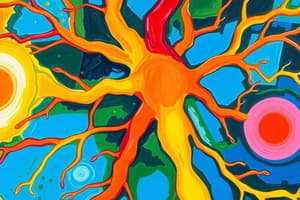Podcast
Questions and Answers
What is the main role of neurons in the nervous system?
What is the main role of neurons in the nervous system?
- Store excess energy for future use
- Absorb nutrients from the environment
- Transmit electrical and chemical signals to other cells (correct)
- Generate heat to regulate body temperature
Which type of neuron transmits information from sensory receptors to the brain?
Which type of neuron transmits information from sensory receptors to the brain?
- Sensory neurons (correct)
- Synaptic neurons
- Interneurons
- Motor neurons
What are the two main subsystems of the nervous system?
What are the two main subsystems of the nervous system?
- Sympathetic and Parasympathetic Nervous Systems
- Sensory and Motor Systems
- Autonomic and Somatic Nervous Systems
- Central and Peripheral Nervous Systems (correct)
How do neurons communicate with each other?
How do neurons communicate with each other?
Which part of the nervous system is composed of the brain and spinal cord?
Which part of the nervous system is composed of the brain and spinal cord?
What is the function of motor neurons in the nervous system?
What is the function of motor neurons in the nervous system?
What is the function of hormones in the body?
What is the function of hormones in the body?
Which brain region serves as a connection between the endocrine and nervous systems?
Which brain region serves as a connection between the endocrine and nervous systems?
What is the main difference between simple and complex reflexes?
What is the main difference between simple and complex reflexes?
Which type of reflex arc is involved in the knee-jerk or patellar reflex?
Which type of reflex arc is involved in the knee-jerk or patellar reflex?
Why are reflexes considered involuntary responses?
Why are reflexes considered involuntary responses?
Which system allows for the maintenance of homeostasis through a complex interplay of chemical and electrical signals?
Which system allows for the maintenance of homeostasis through a complex interplay of chemical and electrical signals?
Flashcards are hidden until you start studying
Study Notes
Neural Control and Coordination: Understanding the Nervous System, Neurons, Hormones, and Reflexes
Neural control and coordination encompass the way our bodies regulate and manage various processes by harnessing the complex network of the nervous system. In this exploration, we'll delve into the roles of neurons, hormones, and reflexes as they relate to this essential aspect of human biology.
The Nervous System
The nervous system is a vast network of specialized cells called neurons that transmit signals to and from every part of the body. It can be divided into two main subsystems: the central nervous system (CNS) and the peripheral nervous system (PNS).
The CNS is composed of the brain and spinal cord, while the PNS consists of the nerves that branch out to carry information to and from the rest of the body's organs and tissues.
Neurons
Neurons are the fundamental units of the nervous system, and their primary role is to transmit electrical and chemical signals to other cells. There are three main types of neurons: sensory neurons, which transmit information from sensory receptors to the brain; motor neurons, which transmit information from the brain to muscles, and interneurons, which transmit information within the nervous system.
Neurons communicate with each other through specialized connections called synapses, where neurotransmitters are released to carry signals across the synaptic cleft and activate the next neuron in the chain.
Hormones
Hormones are chemical messengers produced by glands in the endocrine system that travel through the bloodstream to affect the function of cells and tissues throughout the body. Hormones can act on the nervous system and neurons to modulate various processes, such as growth, metabolism, and behavior.
The hypothalamus, a small region in the brain, serves as a connection between the endocrine and nervous systems. It produces and releases releasing hormones to stimulate the pituitary gland to secrete hormones that control other glands. Together, the endocrine and nervous systems allow for a complex interplay of chemical and electrical signals to maintain homeostasis and coordinate the body's activities.
Reflexes
Reflexes are involuntary, rapid responses to stimuli that do not require conscious thought. They are a fundamental aspect of neural control and coordination, allowing the body to react rapidly to threats or changes in its environment.
Reflexes can be simple or complex. Simple reflexes rely on a single neuron, while complex reflexes involve a series of neurons and may require input from multiple sensory systems. For example, the knee-jerk reflex, also known as the patellar reflex, involves a simple reflex arc with one sensory neuron, one interneuron, and one motor neuron. The stimulation of the patellar tendon causes it to contract and relax, leading to a muscle contraction.
Understanding neural control and coordination is essential to understanding how our bodies function, adapt, and respond to the world around us. The nervous system, neurons, hormones, and reflexes all play critical roles in maintaining homeostasis and enabling us to interact with our environment.
Studying That Suits You
Use AI to generate personalized quizzes and flashcards to suit your learning preferences.




